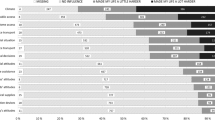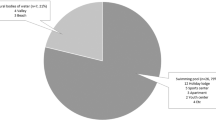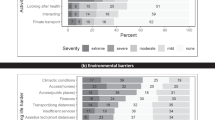Abstract
Study design
Cross-sectional survey.
Objective
Persons with disabilities are disproportionately impacted by extreme weather disasters and climate change. Individuals with spinal cord injury (SCI) are especially at risk due to inability to control their body temperature and mobility concerns. We surveyed rehabilitation professionals in the field of SCI to determine their experiences, concerns and educational needs regarding natural disasters, climate change and sustainability and the effects on their clientele.
Setting
Online survey available to an international cohort.
Methods
The survey was developed by the authors and conducted in 2019. It was distributed amongst various international health care organizations whose members care for persons with SCI. Descriptive statistics and chi-square test for association were performed using Microsoft Excel 2016.
Results
Of 125 respondents, 50% were from Europe, 18% from North America, and 18% from Asia; 74% were physicians and 13% physical therapists. In total 57.6% believed climate change had impacted their client’s health and well-being. Respondents from North America were significantly less likely to report climate change had an impact on their patient’s health than those from Asia or Europe (p < 0.01). In total 82.5% of respondents thought professionals should be concerned with sustainability and 85.5% were interested in further education.
Conclusions
Most respondents acknowledged a need for more information related to the disasters, climate change, and disability. Results underscore the need for further research, professional, and consumer education.
Similar content being viewed by others
Log in or create a free account to read this content
Gain free access to this article, as well as selected content from this journal and more on nature.com
or
References
Watts N, Amann M, Arnell N, Ayebb-Karlsson S, Belesova K, Berry H, et al. The 2018 report of the Lancet Countdown on health and climate change: shaping the health of nations for centuries to come. Lancet. 2018;392:2479–514.
Gaskin C, Taylor D, Kinnear S, Mann J, Hillman W, Moran M. Factors associated with the climate change vulnerability and the adaptive capacity of people with disability: a systematic review. Weather Clim Soc. 2017;9:801–14.
Burns A, O’Connell C, Rathore F. Meeting the challenges of spinal cord injury care following sudden onset disaster-Lessons learned. J Rehabil Med. 2012;44:414–20.
De Vivo MJ, Richards JS. Community reintegration and quality of life following spinal cord injury. Paraplegia. 1992;30:108–12.
Bourque L, Siegel J, Kano M, Wood M, Rodríguez H, Quarantelli E, et al. Morbidity and mortality associated with disasters. 2009. https://doi.org/10.1007/978-0-387-32353-4_6.
Wu X, Lu Y, Zhou S, Chen L, Xu B. Impact of climate change on human infectious diseases: empirical evidence and human adaptation. Environ Int. 2016;86:14–23.
D’Amato G, Vitale C, DeMartino A, Viegi G, Lanza M, Molino A, et al. Effects on asthma and respiratory allergy of climate change and air pollution. Multidiscip Respiratory Med. 2015;10:1–8.
Azage M, Kumie A, Worku A, Bagtzoglou A, Anagnostu E. Effect of climate variability on childhood diarrhea and its high risk periods in northwestern parts of Ethiopia. PLoS ONE. 2017;12:e0186933.
Berry H, Bowen K, Kjellstrom T. Climate change and mental health: a causal pathways framework. Int J Public Health. 2010;55:123–32.
Smith F, Simard M, Twigg J, Kett M, Cole E. Disability and climate resilience: a literature review 2017. http://adaptation.ei.columbia.edu/files/2018/02/Disability-and-Climate-Resilience-Lit-review-.pdf. Accessed 15 Oct 2019.
Wolbring G. A culture of neglect: climate discourse and disabled people. M/C J. 2009;12. ISSN 14412616. http://journal.media-culture.org.au/index.php/mcjournal/article/view/173. Accessed 16 Oct 2019.
Burns AS, O’Connell C, Landry M. Spinal cord injury in postearthquake Haiti: lessons learned and future needs. PMR. 2010;2:695–7.
Chen R, Song y, Kong Q, Zhou C, Liu L. Analysis of 78 patients with spinal injuries in the 2008 Sichuan, China, earthquake. Orthopedics. 2009;32:322–6.
Irgens I, Rekand T, Arora M, Liu N, Marshall R, Biering- Sorensen F, et al. TeleSCI/D—a systematic review and recommendations for development. Spinal Cord. 2018;56:643–55.
Schulte C, Gazendam I. https://www.hrw.org/news/2019/07/15/un-climate-resolution-emphasizes-protection-disability-rights. Accessed 7 Oct 2019.
Author information
Authors and Affiliations
Corresponding author
Ethics declarations
Conflict of interest
MA is CEO of Telerehabilitation International-a NGO that is being formed and has fund-raised for United Spinal Association and Portlight Disaster Strategies regarding disasters, climate change, and spinal cord injuries. The remaining authors declare that they have no conflict of interest.
Ethical approval
We certify that all applicable institutional and governmental regulations concerning the ethical use of human volunteers/animals were followed during the course of this research.
Additional information
Publisher’s note Springer Nature remains neutral with regard to jurisdictional claims in published maps and institutional affiliations.
Rights and permissions
About this article
Cite this article
Alexander, M., Alexander, J., Arora, M. et al. A bellweather for climate change and disability: educational needs of rehabilitation professionals regarding disaster management and spinal cord injuries. Spinal Cord Ser Cases 5, 94 (2019). https://doi.org/10.1038/s41394-019-0239-z
Received:
Accepted:
Published:
Version of record:
DOI: https://doi.org/10.1038/s41394-019-0239-z
This article is cited by
-
Current Approaches in Telehealth and Telerehabilitation for Spinal Cord Injury (TeleSCI)
Current Physical Medicine and Rehabilitation Reports (2022)
-
Pandemics, climate change, and disability related to SCI
Spinal Cord Series and Cases (2020)



